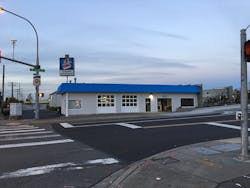With two Service Kings and an ABRA within a two-mile radius, many independent shops may be intimidated by the ominous threat of the Big Four consolidators. Add a 48,000-square-foot Honda dealer body shop into the mix and it’s enough to scare away most. The Stamps family, however, is not easily intimidated and took the challenge head on when the consolidators moved into their market.
When Barrett Stamps’ father, Gary, opened the Collision 1 Auburn location in 1981, the landscape looked a lot different than it does today. When he started out, there were four or five independent shops in the market. Now, Stamps doesn’t think there’s a shop within the market that hasn’t changed hands at least once. This is something that differentiates the shop and the Stamps have used it to their advantage.
The Backstory
Stamps’ father, Gary, opened the Auburn location when he was 26, which is the same age that Stamps was when he came on board in 2013 to join his father as manager at the same location. In 1989, Gary expanded the Auburn location to the size it is today. At the same time, the 10,000 square-foot shop became the second largest in the market. In 2003, they expanded to a second location in Bonney Lake. The two locations are both still owned by Gary with Stamps, 30, and his sister, Kindra, 28, helping out. Stamps manages the Auburn location and Kindra manages Bonney Lake. The plan is to eventually transfer ownership to the siblings.
The Problem
About three years ago, national consolidators began moving into Auburn’s marketplace.
“One of the things we noticed right away was that the insurance companies were switching to the consolidators,” Stamps says.
For 5-6 months, Stamps says that they noticed a difference in the amount of work they received. From some of their customers, they found out that they were being encouraged to go to the larger MSOs by their insurance companies.
“As soon as the shops were acquired, we saw them rise to the top tier of certain DRPs,” Stamps says.
Stamps says that there are multiple factors that an insurer looks for when recommending a shop, but price is usually at the top, which initially hurt his business.
“There has to be a balance,” Stamps says. “It can’t just always be, ‘this shop is the cheapest, let’s send them there.’”
The Bonnie Bell location continued to be a top performer in its market, but with the new competition moving in, Stamps and the Auburn location needed to re-evaluate.
Two Abra locations moved into the market in 2013 within five miles of the location. The Auburn shop didn’t see any real impact from this move but at the end of 2014, Service King moved in. That’s when Stamps noticed some changes in his shop.
“The first six months of 2015, we were down in year-over-year sales a little over 10 percent,” Stamps says. “Within those first few months, we lost between 10–15 jobs.”
The Solution
Even though work slowed for a few months, Stamps says he didn’t panic.
Stamps says that both of the Auburn and the Bonney Lake location separate themselves from the competition by being the top performer when it comes to customer service.
“I know our numbers and our performance metrics,” Stamps says. “We knew we were steady. It wasn’t that there was a deficit in our shop and that we weren’t performing. Knowing our numbers was our biggest benefit.”
By tracking numbers in house and not relying on the insurance companies, Stamps was able to see exactly how his shop was performing.
“Having your data and knowing and understanding it is imperative to taking your company where you want it to go,” Stamps says. “If you know what your shop’s capability is and what an insurance company is looking for, then you should be fine.”
Stamps used his CCC ONE management system and BASF’s VisionPlus Online to track most of the shop’s performance metrics. As for keeping track of what was important to the insurance company, Stamps used Enterprise ARMS Suite, which tracks the amount of rental days. By doing this, Stamps saw that the Auburn location was consistently ahead of its competition when it came to length of rental (LOR).
“At times, we were a full day ahead,” Stamps says.
This re-instated what Stamps already knew—the shop was performing well. If they continued to deliver consistent, top-notch service to customers, he was confident that the shop would be OK.
During the morning shop meetings, Stamps communicated what was going on with the rest of staff in order to keep everyone involved with what was going on. They then set goals for performance metrics to hit.
“Everyone has skin in the game, which makes the entire team work together to achieve the goals that we have set forth,” Stamps says.
With all of that information handy, Stamps was prepared if an insurer ever came to him and said that the location wasn’t performing.
The Aftermath
Within six months, the shop was performing even better than it did before the consolidators came in. In 2014, the MSO did annual sales of $2.2 million. In 2015, it rose to $2.95 million and hit just over $3 million in 2016.
By essentially doing nothing and relying on what had always worked, Stamps says the Auburn location rode out the storm and is able to compete side-by-side with the large MSOs.
The Takeaway
Because he was confident in his shop’s ability and reputation within the community, Stamps was able to ride out the difficult time. For any shop owner that’s put in a similar situation, his biggest piece of advice is to continue to track numbers and have that handy in case an insurer says your shop is not performing.
“There’s so much work, the consolidators can’t fix them all,” Stamps says. “Some consolidators have hundreds of shops to manage. There is still so much opportunity for independents.”
By remaining true to its core values and delivering top notch customer service, Collision 1 in Auburn differentiated itself from the competition that moved into the market.
“For all of the attention that consolidators get, there is still plenty of room for shops of any size to succeed,” Stamps says. “There’s always opportunity.”

